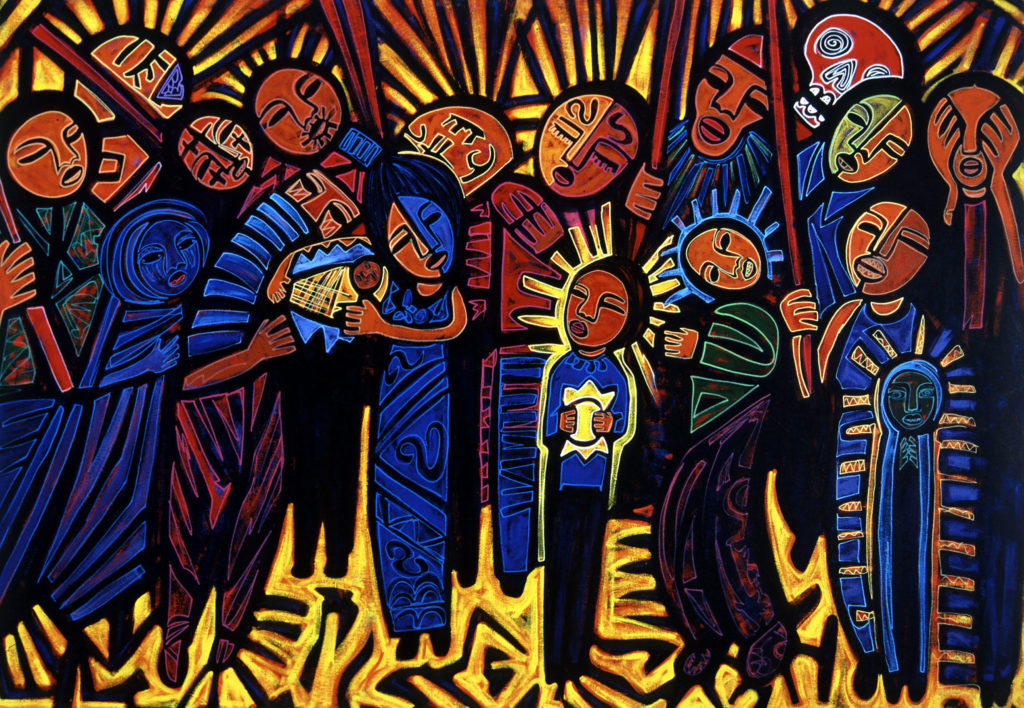
Christmas 2020 comes at the end of a year that none of us could’ve imagined just 12 months ago. And though we’re making our way through a period of uncertainty — understated as that word is for what we experience — this is perhaps a good time for reflection. We asked Brett Hoover, professor of theological studies in the LMU Bellarmine College of Liberal Arts, to share his thoughts on the Nativity that we celebrate on Dec. 25. We also asked several members of the LMU community to share a Christmas wish for 2020.—The Editor
Christmas is a mess. Literally this has always been so, with the inevitable chaos created by dragging in a Christmas tree and decorating it, and the fragments of wrapping paper and ribbon that turn up in astonishing places. Then there is the infamous figurative mess of the holidays. Families debate who will host Christmas, and we take account of the disappointments and resentments that ensue. Family dysfunction emerges.
This year, family gatherings are also subject to messy local and state public health restrictions, as well as strange silence from the federal government. We worry about older or vulnerable family members, some holed up alone. For some of us, a reduction in frenzied holiday activity surfaces otherwise silent personal demons. And with or without tensions around COVID-19, Christmas spirituality always has had to struggle against consumer desires on full display. The compulsion to acquire easily crowds out our hopes for peace on earth (or within our polarized homes) and universal goodwill. Christmas is a mess.
The Christian gospel stories about Christmas, however, point precisely toward a divine love found in the midst of apparent chaos. In Luke, an inconvenient census sets Mary and Joseph off on an unwelcome journey to Bethlehem, where a lack of hospitality consigns poor Mary to giving birth in a dirty stall used for livestock. Shepherds show up, probably smelling like the sheep (and not in the metaphorical way Pope Francis recommends). In Matthew, there are astrologer tourists and a narrow escape from a tyrannical government. The famous metaphor of the Gospel of John, where God pitches the divine tent among us (John 1:14), suggests the dust of outdoor living. Even without these picturesque details, the Incarnation is a mess. God becomes flesh; flesh is messy. We rightly laugh, glimpsing sanitized childbirth on television instead of a gooey, anxiety-producing, painful mess.
Christmas does not offer us a respite from reality; it asks us to have faith anyway.
Christmas in disarray — experientially or biblically — tells of a greater spiritual truth. In the formulation of the Jesuit martyr Ignacio Ellacuría and his interpreter Jon Sobrino, S.J., spirituality must come to terms with the real. The image we project of beautiful efficient creatures does not pass the reality smell test. We know that deep down we are vulnerable, petty, emotionally complex, ever aging, scared human beings. Our relationships inevitably manifest not just our strengths but our weaknesses. Thousands of people remain as homeless as Mary and Joseph were on their journey to Bethlehem, and others as sick or disturbed, fearful or unemployed, as were the people in need Jesus encountered during his earthly life. Too many of us appear as endangered or helpless before the pandemic, as the child Jesus did before Herod.
Christmas does not offer us a respite from reality; it asks us to have faith anyway. God does not come to us in our strength and self-sufficiency, but in messy, dirty, muddled, complex lives. Divine love is ultimately not affirmed in my Christmas smile, but in the way my wife (or my friends, or my colleagues) stays steady in her care and respect for her moody, brooding husband. The God we experience through Christmas is not some tidy deity for beaming, well-groomed family photographs. Christmas speaks of God incarnate in a filthy manger, a God at home with insufficient bank accounts, cat-toppled Christmas trees, chaotic family Zooms and COVID-restricted gatherings. The love of God is alive with us in the mess, not relegated to some brighter, healthier, better-vacuumed, less complicated Yuletide paradise.
Brett Hoover is assistant professor of theological studies in the LMU Bellarmine College of Liberal Arts and graduate director of Theological Studies. He is the author of “The Shared Parish: Latinos, Anglos, and the Future of U.S. Catholicism,” and he is coeditor of “Hispanic Ministry in the 21stCentury: Urgent Issues.”
